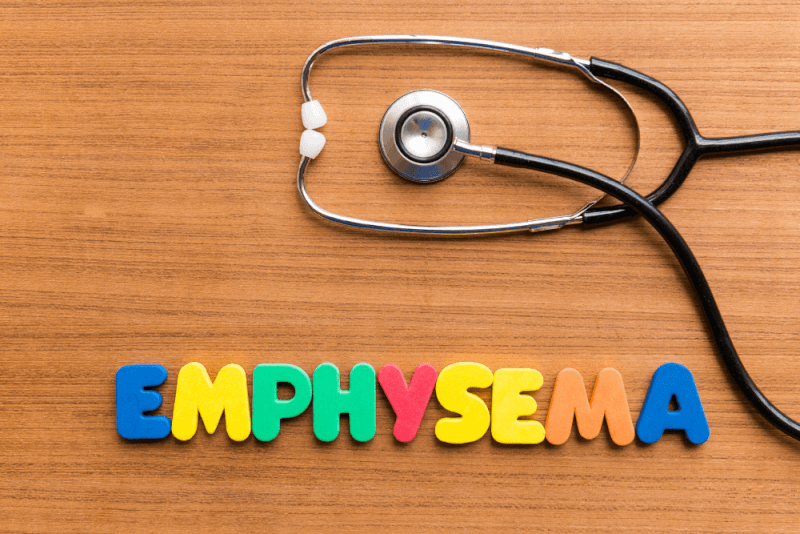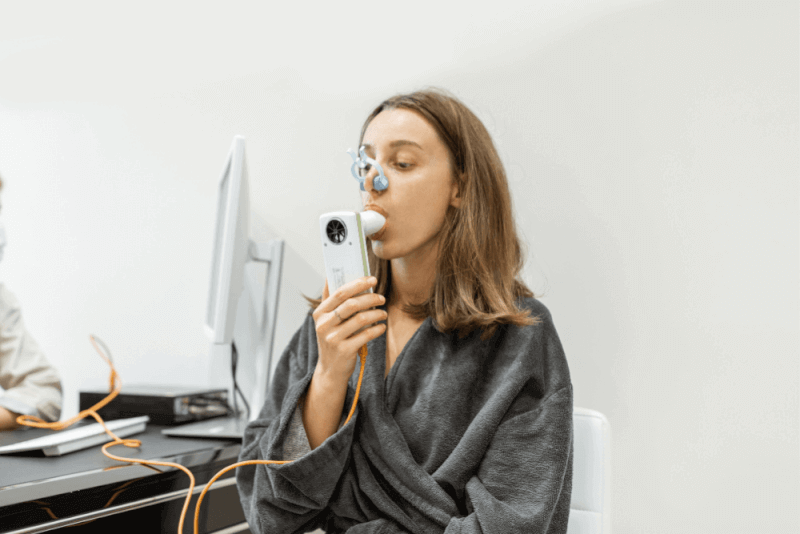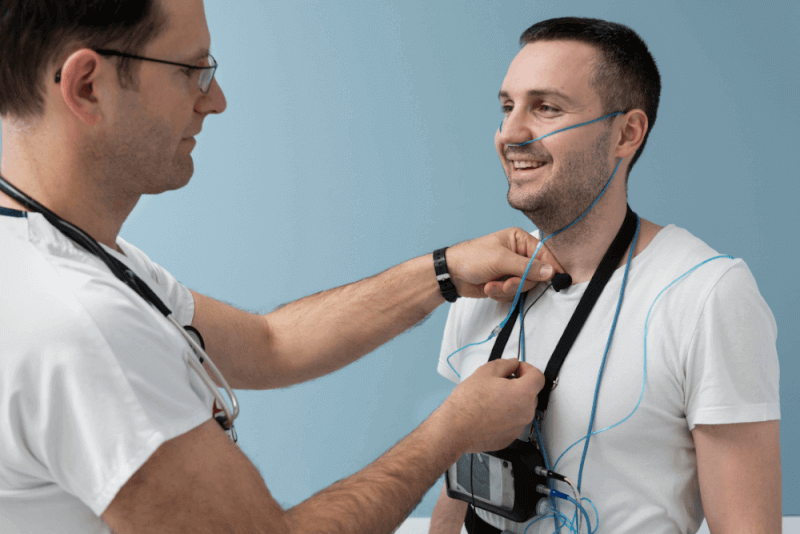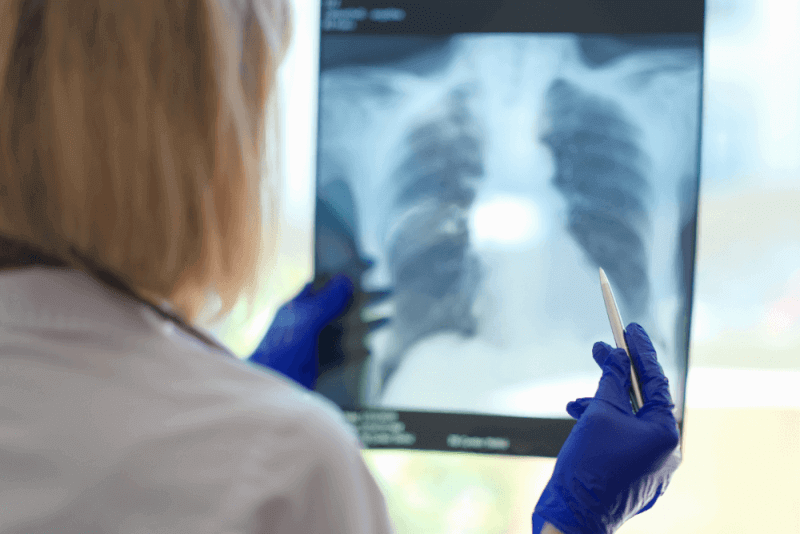30-Second Summary
- Emphysema is a disease characterized by the damage and enlargement of the air sacs (alveoli) in the lungs.
- It is usually seen in smokers, but other factors such as genetic predisposition, air pollution, and occupational exposure can also increase the risk.
- It can cause symptoms such as shortness of breath, cough, wheezing, and chest pain.
- If left untreated, it can be fatal.
- Treatment includes quitting smoking, regular exercise, oxygen therapy, and medication.
What is Emphysema?
Emphysema is a disease where the alveoli in the lung structure are damaged, disrupting the air exchange in the lungs. Emphysema patients especially struggle during exercise. Emphysema causes the lungs to lose their elasticity. Emphysema and chronic bronchitis constitute the two main subtypes of COPD.
Types of Emphysema
Emphysema is divided into 3 main types, which include:
Paraseptal Emphysema
Also known as distal acinar emphysema, this is the rarest type of emphysema. It primarily damages the channels connecting to the air sacs that aid in breathing. It usually affects the upper parts of the lungs, causing fluid-filled sacs called bullae to form.
This type is more common in men than women and is associated with smoking, pollution, and exposure to toxic substances. Symptoms are not seen until half of the lung is affected. When symptoms do appear, patients may experience the following:
- Shortness of breath while climbing stairs or doing routine tasks
- Feeling unusually tired
- Sometimes feeling like there is not enough air in the lungs
- Coughing up phlegm
- Chronic cough
- Wheezing
Centrilobular Emphysema
Centrilobular emphysema gets its name from the specific regions of the alveoli that are damaged. It is a more specific type of emphysema compared to other types and significantly affects patients' daily lives, including their ability to perform daily tasks.
This type occurs in the center of the lungs and begins to affect the bronchioles as the disease progresses. When the damage reaches this extent, it can impair the entire respiratory system.
Centrilobular emphysema is seen in people who are exposed to irritating substances for long periods. Symptoms of this type include:
- Wheezing
- Shortness of breath
- Chest tightness
- Excessive phlegm production when coughing
- Difficulty performing daily tasks
Panlobular Emphysema
Also known as panacinar emphysema, this type affects a part of the lung and causes permanent damage to the alveoli in the affected area. It affects the entire acinus, including the alveolar ducts, alveolar sacs, and alveoli. The damage in this type is evenly distributed.
Symptoms of panlobular emphysema include:
- Shortness of breath
- Persistent cough
- Difficulty performing daily activities
- Weight loss
- Loss of appetite
- Excessive phlegm production
- Wheezing
- Chest tightness
- Bluish color around the lips and fingernails
- Depression
- Anxiety
- Frequent respiratory infections
Symptoms of Emphysema
Symptoms of emphysema usually begin between the ages of 45 and 60 in smokers. However, lung damage starts earlier. Patients with emphysema need to use their breathing muscles more, causing them to tire quickly. Therefore, they experience difficulty breathing even after light exercise.
The first symptom of emphysema is usually shortness of breath. Other early symptoms include:
- Chest tightness,
- Chest pain,
- Persistent cough,
- Wheezing,
As emphysema progresses, symptoms may include:
- Weight loss,
- Headaches,
- Recurring lung infections,
- Fatigue,
- Cyanosis of the lips and nails,
- Sleep problems,
- Depression,
- Loss of appetite,
Causes of Emphysema
The two most common causes of emphysema are smoking and AAT deficiency. Smokers are six times more likely to develop emphysema compared to the general population.
AAT deficiency is another common cause. AAT is a protein in the blood that prevents white blood cells from damaging healthy tissues. White blood cells protect the body from infection. Some people have lower levels of AAT due to genetic factors, leading to lung tissue damage.
The risk of emphysema is significantly higher in people who smoke and have AAT deficiency. These individuals may also experience liver problems.
Other causes of emphysema include passive smoking and inhaling irritant substances due to air pollution.
Diagnosis of Emphysema
Symptoms alone are not sufficient for a diagnosis of emphysema. A detailed physical examination and diagnostic tests are necessary. Diagnosis is usually confirmed with lung function tests.
Spirometry is another test that measures lung capacity. Imaging methods such as CT scans or X-rays are also used.
Treatment of Emphysema
Emphysema is an incurable disease. The damage caused by emphysema is irreversible. Therefore, treatment aims to halt the disease's progression and reduce symptoms.
Pulmonary Rehabilitation
Pulmonary rehabilitation teaches patients proper breathing techniques. Regular exercises help patients adapt to new techniques and form habits. Pulmonary rehabilitation reduces symptoms such as shortness of breath.
Nutritional Therapy
In the early stages of emphysema, many patients are overweight. Therefore, achieving ideal weight makes breathing easier.
In the later stages of the disease, patients may experience eating disorders and rapid weight loss. Nutritional therapy helps them regain ideal weight and support their immune system.
Oxygen Support
Advanced emphysema patients have significantly reduced oxygen levels in their blood and require oxygen support. Most advanced emphysema patients need 24-hour oxygen support and use home oxygen devices.
Lung Volume Reduction Surgery
This surgery removes damaged tissue caused by emphysema, allowing the remaining healthy lung tissue to function more efficiently.
Surgery Summary
Duration: 2-4 hours
Type of Anesthesia: General
Hospital Stay: 4-7 days
Return to Work: 6-8 weeks
Lung Transplant
Lung transplant is considered for patients with severe lung damage and no other treatment options.
Preventing Emphysema Complications
- Quitting smoking improves overall health and helps halt the progression of emphysema.
- Shortness of breath makes exercise difficult for emphysema patients, but they should continue to be active. Regular exercise increases lung capacity.
- Emphysema patients should protect themselves in cold weather, as it can constrict the airways. Patients should take precautions such as wearing masks when going out in cold weather.
Emphysema patients frequently experience lung infections. Therefore, they should get regular pneumonia vaccinations and protect themselves from illnesses like flu and colds. They should avoid crowded places during flu season.
Emphysema Nutrition
Patients in the early stages of emphysema are often overweight, which makes breathing difficult. Their diet should be adjusted, and they should follow personalized nutrition programs to achieve ideal weight.
In the advanced stages of emphysema, patients experience significant weight loss and weakened immune systems. These patients should return to their ideal weight with healthy eating habits and support their immune systems through nutrition.
What Should Emphysema Patients Be Careful About?
Emphysema patients should quit smoking and avoid respiratory infections to reduce the severity of symptoms. Here are some tips:
- Wash hands frequently
- Brush teeth and floss daily
- Use antibacterial mouthwash after meals
- Keep respiratory equipment clean
- Keep the house clean and dust-free
- Get regular vaccinations for flu and pneumonia
- Get an exercise program from health experts and exercise regularly
Avoid irritants such as smoke, car exhaust, strong perfumes, cleaning products, pollen, paint, and pet dander.
How Long Do Emphysema Patients Live?
The life expectancy of emphysema patients varies based on age and the stage of emphysema. Smoking status also affects life expectancy, as smokers or former smokers live an average of 3.5 years less. Genetic factors also influence life expectancy.
- Stage 1 emphysema patients who smoke have a 3.8-year reduction in life expectancy. Those who quit smoking or never smoked are not expected to have reduced life expectancy.
- Stage 2 emphysema patients who smoke have a 5.7-year reduction in life expectancy. Former smokers have a 4.9-year reduction, while those who never smoked have a 0.7-year reduction.
- Stage 3 emphysema patients who smoke have a 9.3 year reduction in life expectancy. Former smokers have a 4.9-year reduction, while those who never smoked have a 1.3 year reduction.
- Stage 4 emphysema patients who smoke have a 9.3 year reduction in life expectancy. Former smokers have a 9.1-year reduction, while those who never smoked have a 1.3 year reduction.












